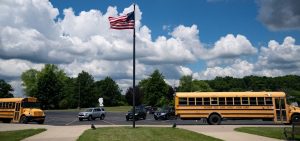News
Alexander aims for its first normal school year since the start of the pandemic
By: Theo Peck-Suzuki | Report for America
Posted on:
ALBANY, Ohio (WOUB/Report for America) — Classes. Standardized tests. Driving to school.
That’s what was on the minds of students at Alexander Junior High/High School after the first week of the fall semester.
It’s an ordinary list of concerns for what everyone hopes will be a very ordinary school year — the first since the start of the COVID-19 pandemic in spring 2020.
Alexander switched to remote learning that spring. Eighth grade math teacher Taylor Rhyan said the change led to massive gaps in student learning.
“Kids weren’t interacting,” he said, “and you could see that there was this real shift in their development when they came back.”
His colleagues Rachel Terry and Katie Holdcroft, who co-teach an English class, expressed similar concerns.
“It sounded like it would be easy,” Terry recalled. “It really did. Like, oh, you just make a video, and you just post this lesson. It’s so much more than that.”
“It was hard for everybody,” agreed Holdcroft. “There were very, very few who thrived in that scenario. And most of them didn’t.”
Not every student felt that remote learning set them back. Sophomore Kayleigh Ferraro said not having the usual stressors that come with in-person schooling gave her space for significant personal growth.
“Before COVID, I was not very good at schoolwork and being a good student,” she said. “Now, I am more confident in myself.”
She added, “It was quite easy to focus on schoolwork. Just pop in an earbud. Easy.”
Other students had worse experiences. Senior Carlee Barnhouse said she struggled to focus when learning from home. “You kind of want to sit around and do nothing,” she said. “I had to force myself to do schoolwork.”
A recent study from the Brookings Institute found student performance declined nationwide because of the pandemic. Alexander saw a 10-point drop in state test results between 2020 and 2021.
The district returned to in-person classes at the beginning of last year, with several new COVID protocols in place. These included masking, social distancing and other policies, such as wiping down desks after class.

“The anxiety was high on the kids’ part,” Terry recalled. “You had a lot of mental health things happening in the classroom.”
Multiple teachers reported that masks made it hard to connect with students and read their emotions. And there were times during the year when contact tracing would take huge groups of students out of school at once, creating additional learning gaps.
The stress took a toll. Terry said she used yoga to help her cope. She and Holdcroft found opportunities to go outside when they could.
“You just had to decompress,” Terry said. “It eats at you more than you would think.”
Science teacher Jordan Myles felt similarly. “Teaching’s one of those jobs you don’t get to just drop at the door. You take it home with you.”
“In my personal life,” he said, “I have my own mentors that I go to to blow some steam off, and that’s something I even encourage my students to do [with their mentors].”
COVID is still present, but teachers expressed confidence that rolling back restrictions was a good idea, with vaccines and more effective treatment available.
They also voiced excitement about the robust curricula they can finally offer again. For Myles, it’s the medical detectives class, in which kids will be presented with a disease outbreak which they will trace to its origin while crafting public health notices. Terry and Holdcroft, meanwhile, have revamped their English classes in order to teach to grade-level standards while meeting kids – particularly those who have fallen behind – at their current reading level.
Things might still change if the school suffers another outbreak. Nevertheless, teachers overall seemed optimistic.
“The good things about not having so many mandates definitely outweigh my concerns,” said math teacher Rhyan. “Versus, if you asked me that question two years ago, would’ve been polar opposite.”
Theo Peck-Suzuki is a corps member with Report for America, a national service program that places journalists into local newsrooms. He covers Children and Poverty for WOUB Public Media.

